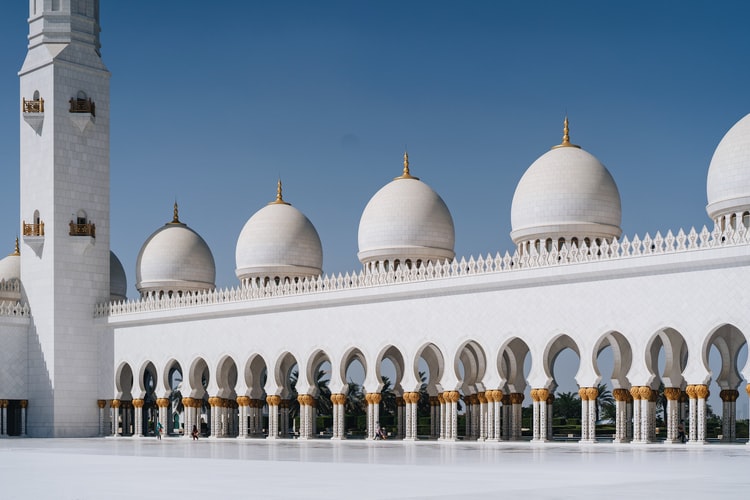
This is the most important pillar because without saying the shahadah – one is not a Muslim. This is done by saying:
“Ash-hadu alla ilaaha illa Allah wa ask-hadu anna Muhammadan ‘abduhu wa rasuluh” which means “I bear witness that none has the right to be worshiped except Allah, and I bear witness that Muhammad (Peace and Blessings be upon him) is His slave and Messenger”.
It is therefore an Islamic Creed declaring the Oneness of God (Islamic monotheism) and that prophet Muhammad (Peace and Blessings be upon him) was sent to all of humanity to be God’s Messenger. We worship only God directly without any medium or intercessors and His Messenger is simply a human being, a slave of God just like you and me, with no divinity.
“Say (O Muhammad SallAllahu ‘alayhi wa sallam): “I am only a man like you. It has been inspired to me that your Ilah (God) is One Ilah (God i.e. Allah). So whoever hopes for the Meeting with his Lord, let him work righteousness and associate none as a partner in the worship of his Lord.” (Qur’an surah al Kahf 18: 110)
The prayer is a means of communicating to God and it is an obligation for every Muslim to pray 5 times a day. Of course, those who just took shahadah, it is advisable to understand the recitations of every position in the prayer in your own language and perhaps start praying once a day inshaAllah. Progressively you will try and increase to 2, then 3, then 4 and eventually 5 x a day. There is no deadline on when you should start to pray 5x a day. However, the sooner you achieve it inshaAllah, not only would you complete the submission of the pillar, but you will definitely feel very close to Allah, and will be Protected from committing sins:
“…and perform As-Salat (Iqamat-as-Salat). Verily, As-Salat (the prayer) prevents from Al-Fahsha’ (i.e. great sins of every kind, unlawful sexual intercourse, etc.) and Al-Munkar (i.e. disbelief, polytheism, and every kind of evil wicked deed, etc.)…” (Qur’an surah al Ankabut 29: 45)
The prayer will also be the very first question which we will be asked on the Day of Judgment.
It was narrated from Abu Hurayrah that the Prophet (peace and blessings of Allaah be upon him) said: “The first thing among their deeds for which the people will be brought to account on the Day of Resurrection will be prayer….”
(Narrated by Abu Dawood, 864)
Zakat is incumbent upon every single Muslim who has a certain amount of savings to contribute to several groups of people, such as the poor, the travellers, those who are in debt, etc. In certain countries where people have crops, certain types of crops must also be contributed to this zakat. In Islam the poor has an entitlement to our wealth and the main purpose of zakat, besides to feed the poor, is to purify our wealth.
Fasting is obligatory in the Islamic month of Ramadan on adult, sane, males and females who are in good health and who is not travelling. A Muslim is not allowed to drink and eat throughout the whole month of Ramadan from sunrise to sunset. When studied in detail, a Muslim must also discipline the tongue, the eyes, the ears and other parts of the body so that every part will only perform good righteous deeds.
“O you who believe! Observing As-Saum (the fasting) is prescribed for you as it was prescribed for those before you, that you may become Al-Muttaqun (the pious).” (Qur’an surah al Baqarah 2: 183)
Hajj is a pilgrimage to Makkah which has to be performed for those who can afford this. A pilgrim will have to under go through the who Hajj ritual which was actually was first started by prophet Ibrahim (peace be upon him) when Allah Ordered him:
“And proclaim to mankind the Hajj (pilgrimage). They will come to you on foot and on every lean camel, they will come from every deep and distant (wide) mountain highway (to perform Hajj).” (Qur’an surah al Hajj 22: 27)
They must only be performed during the Hajj months (Islamic months 10,11,12). The reward of a Hajj which is accepted by Allah (called hajj Mabrur) is forgiveness of all major and minor sins.
It was narrated that Abu Hurayrah (may Allah be pleased with him) said: I heard the Prophet (blessings and peace of Allah be upon him) say: “Whoever performs Hajj for the sake of Allah and does not utter any obscene speech or do any evil deed, will go back (free of sin) as his mother bore him.”
Narrated by al-Bukhaari, and Muslim
The Messenger of Allah (SallAllahu ‘alayhi wa sallam) said, “(The performance of) ‘Umrah is an expiation for the sins committed between it and the previous ‘Umrah; and the reward of Hajj Mabrur (i.e., one accepted) is nothing but Jannah.”
Narrated by Al-Bukhari and Muslim



